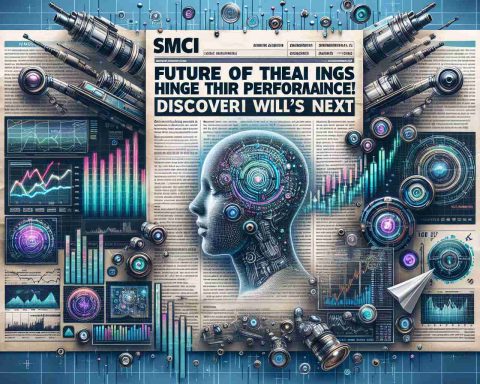The Future of Tesla: Innovations Reshaping Markets
Tesla is at the forefront of groundbreaking changes in the automotive landscape, captivating the attention of investors and market analysts alike. As the company forges ahead with new technological advancements, the potential impact on its stock valuation and overall market behavior is vast.
Significant Technological Advancements: Recently, Tesla has hinted at major updates to its Full Self-Driving (FSD) system, which, if successful and regulated, could introduce lucrative revenue opportunities. Current testing has shown encouraging results, positioning Tesla as a frontrunner in the autonomous driving domain, which might significantly boost its stock prices as investors assess long-term gains.
Power of AI: Tesla’s ambitions in artificial intelligence were prominently featured during recent announcements. Advances in AI are likely to revolutionize not only the manufacturing processes but also the software in vehicles, leading to greater efficiency and cost reductions, which in turn can enhance investor sentiment.
Green Energy Initiatives: Tesla’s strategic expansion into solar and energy storage aligns with the global shift towards renewable energy. Innovations in battery technology are key to reducing carbon footprints and may attract investors interested in sustainable ventures.
In conclusion, while Tesla’s roadmap is filled with promising developments offering notable opportunities, navigating through challenges in a competitive landscape will be crucial for sustaining its market position and driving future growth.
Broader Implications of Tesla’s Innovations
As Tesla spearheads innovation in the automotive sector, its influence extends well beyond the confines of electric vehicles. The company’s trajectory is poised to reshape significant elements of society and culture, as consumers increasingly prioritize sustainability and cutting-edge technology in their daily lives.
The rise of autonomous driving technology could lead to profound transformations in urban planning and infrastructure. As vehicles become more autonomous, cities may see a reduction in traffic congestion and an increase in space for green areas and pedestrian zones. This shift could enhance quality of life and promote community engagement, altering the fabric of modern urban living.
Global Economic Impact: Tesla’s focus on renewable energy and electric vehicle production supports the international transition to a low-carbon economy. By promoting advancements in battery technology and energy systems, the company positions itself at the intersection of automotive and energy markets, influencing global supply chains and boosting green job creation. According to a recent report, the clean energy sector could generate over 24 million jobs worldwide by 2030, indicating profound economic ramifications.
Environmental Considerations: While Tesla advocates for greener practices, the production of batteries carries potential environmental risks, such as resource extraction and e-waste challenges. Addressing these issues through sustainable practices will be vital for minimizing long-term ecological impacts.
In conclusion, Tesla’s innovations not only forecast significant advancements in technology and market dynamics, but they also highlight intricate links between environmental sustainability, economic growth, and societal shifts that will shape our future landscapes.
Revolutionizing Transportation: What’s Next for Tesla?
The Future of Tesla: Innovations Reshaping Markets
Tesla continues to lead the charge in the automotive and energy sectors, harnessing cutting-edge technology to stay ahead of its competitors. As the company adapts to an ever-changing landscape, several key areas warrant attention from investors and consumers alike.
# Significant Technological Advancements
One of the most talked-about developments is the anticipated update to Tesla’s Full Self-Driving (FSD) system. As the company experiments with advanced neural network algorithms and improved sensor technology, the potential for a fully autonomous vehicle could reshape the industry. If successful, this could open new revenue streams through subscription models and self-driving taxi services, enhancing Tesla’s stock valuation significantly.
# Power of AI
AI is not just a tool for Tesla; it is a cornerstone of their innovation strategy. The integration of AI in manufacturing allows for predictive maintenance and streamlined production workflows. Moreover, Tesla’s software updates enable vehicles to learn and adapt to driver behaviors, enhancing safety and experience. Investors are likely to take note of Tesla as a leader in applying AI to enhance product offerings and improve operational efficiencies.
# Green Energy Initiatives
Tesla is actively transforming its business model to include renewable energy solutions. Their recent innovations in battery technology are particularly noteworthy, enabling longer power storage and efficient energy usage. As the world shifts towards net-zero emissions, Tesla’s energy storage products, like the Powerwall and Megapack, could become key components in residential and commercial energy management systems, attracting eco-conscious investors.
# Pros and Cons of Investing in Tesla
Pros:
– Leadership in electric vehicle (EV) technology.
– Expansion into autonomous driving could revolutionize transportation.
– Strong brand recognition and consumer loyalty.
– Innovative forays into energy solutions and battery technology.
Cons:
– Intense competition from traditional automakers and new entrants in the EV space.
– Regulatory challenges associated with self-driving technology.
– Dependence on global supply chains which can be affected by geopolitical tensions.
# Limitations and Challenges
Despite its strengths, Tesla faces significant challenges. Competition is increasing, with traditional automakers ramping up their EV offerings. Furthermore, regulatory scrutiny regarding the safety of autonomous vehicles could pose hurdles for Tesla’s FSD ambitions. Supply chain disruptions, especially concerning semiconductors and raw materials for batteries, could also hinder production capabilities.
# Market Predictions and Trends
Analysts predict that as renewable energy technologies become more mainstream, Tesla’s stock could see substantial growth. The rise of electric fleets, increased investment in smart grids, and advancements in energy storage solutions point towards a thriving market for Tesla’s diversified product lineup.
# Conclusion
Tesla’s trajectory is characterized by innovation, ambition, and a commitment to shaping the future of the automotive and energy sectors. As it navigates through opportunities and challenges, Tesla’s adaptations and advancements could profoundly influence market trends and its long-term viability. Investors should remain vigilant and consider Tesla’s innovations in the context of a rapidly evolving landscape.
For more insights into Tesla’s trajectory and innovations, visit official Tesla website.




















